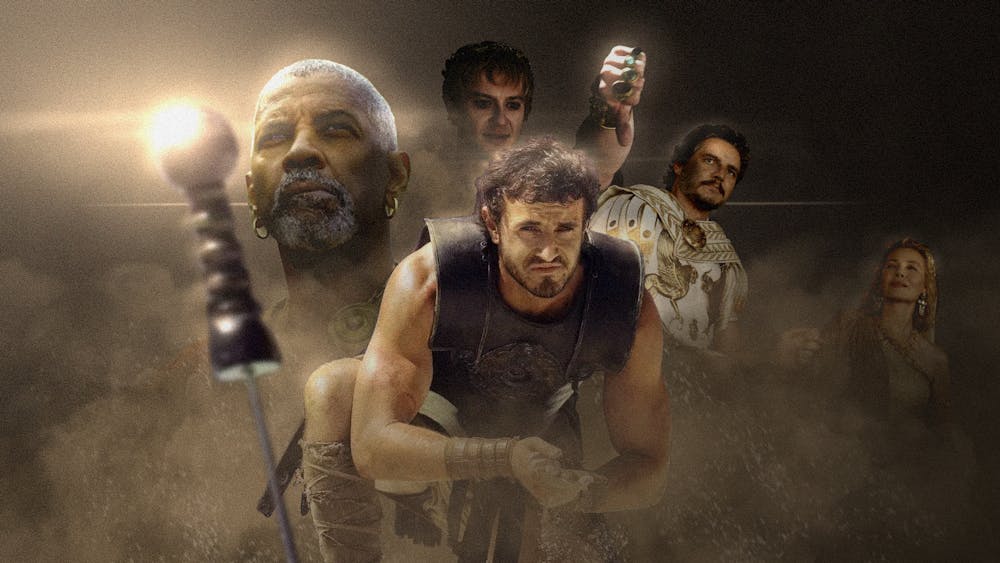I’m going to be honest, I almost fell for it too. Big Ridley Scott Haters almost got me.
I went into Gladiator II with my expectations in check. I have a deep love for the original; it's also one of my dad’s (and I think every dad’s) favorite films. But early reviews of the sequel were pretty mixed. I was skeptical that Paul Mescal could live up to Russell Crowe’s towering performance from 2000. When I walked into the theater, I would have been satisfied with a fun Denzel Washington performance—a solid three–star film.
I was dead wrong. From performances to Scott’s grand–scale direction, it’s the most fun I've had at a movie this year. And yet—like always—Scott is largely getting ignored by mainstream movie culture. Gladiator II will make money, but with its likely Oscar snubs, Scott will have to soldier on making three films every 18 months.
But for now, I want to give Scott his flowers. Gladiator II is as big a spectacle as you’ll see on the big screen. Naval battles, gladiators fighting rhinos, Denzel Washington filling the screen with his charisma—this movie has it all.
Scott might just be the last of the great epic directors, the lineage including Cecil B. DeMille and David Lean. Is Gladiator II as good as some of those movies? Probably not. But it’s the closest thing we have to it. And for that, I’m grateful.
Gladiator II’s plot is deeply similar to its predecessor. We begin in Numidia with Paul Mescal’s Lucius, the son of Lucilla (Connie Nielsen) from the original. Having escaped the excesses of Rome, Lucius has settled in Numidia with his wife and seems to lead a peaceful life. That is until it is interrupted when General Acasius (Pedro Pascal) appears with legions of Roman soldiers intent on conquering Numidia. They succeed in a grand–scale Naval assault, resulting in the death of Lucius’ wife, which is among the best battle scenes Scott has directed.
Lucius is taken to Rome as a prisoner of war, intent on getting revenge on General Acasius. He is bought as a gladiator by Macrinus (Denzel Washington), a wealthy businessman who plans to use Lucius to gain power in Rome. Twin emperors Geta (Joseph Quinn) and Caracalla (Fred Hechinger) preside over a debaucherous, overly–consumptive Rome that has clearly failed to live up to the idealized dream of Rome that Maximus put forth in the original film.
What follows is the usual plotting and scheming, but Scott’s willingness to allow his cast to be absolutely unhinged with the material makes this truly special. Even given Washington's lofty standards, he is sensational in this role. Scott smartly understood that Mescal has a very different presence than Crowe. Whereas Crowe was commanding and imposing, Mescal is reserved and confident. Here's where Washington comes in: He takes over any scene he’s in and fills in where Mescal can sometimes fall short.
This isn’t to say Mescal is bad in this movie. Much of the character's conflict has to be conveyed in quieter, more interior moments, which is something Mescal excels at. He’s also helped by the other supporting parts going wild. Quinn and Hechinger give deranged performances as if Scott told them to swim in the river of ham. Pascal also gets an opportunity to show something he hasn’t yet shown on the big screen. He brings a sturdiness and honor that plays against the ever–decaying moral fabric of Rome.
While the first Gladiator was a stately chamber piece filled with Ridley Scott’s favorite British character actors from his youth, Gladiator II is loud, obnoxious, and fun. It perfectly matches its 87–year–old director’s “no fucks given” attitude. The original feels like a 60–year–old man hoping change will come in his lifetime. Gladiator II is that same man who has given up hope of real change and has decided to make the best of the time he’s got.
The villain in the original film is a cunning emperor operating within the halls of power. In Gladiator II, it’s Macrinus, a rich businessman who thinks he can buy power and prestige from the crumbling institutions of a once–great empire. Ridley Scott has never been a subtle filmmaker but even for him, this is on the nose. This is the kind of unsubtle cynicism that defines his underrated filmography.
Napoleon, The Last Duel, House of Gucci, and now Gladiator II form a kind of quadrilogy about the ridiculousness of classic European stories. Scott has always had an anti–establishment streak to his filmmaking and that has only increased as he’s entered his no–fucks–given era.
In a just world, Gladiator II would be getting the same kind of appreciation as Top Gun: Maverick. A long–gestating, legacy sequel that kind of has the same plot as the original, but who cares this is so fun.
Alas, we apparently do not live in a just world and I will have to continue to beat the drum in praise of my Lord, Ridley Scott, alone. Unless, of course, you want to join in.

